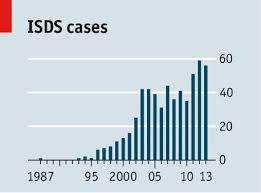Investment arbitration is a procedure to resolve disputes between foreign investors and host States (also called Investor-State Dispute Settlement or ISDS). The possibility for a foreign investor to sue a host State is considered as a guarantee for the foreign investor that, in the case of a dispute, it will have access to independent and qualified arbitrators who will solve the dispute and render an enforceable award. This allows the foreign investors to bypass national jurisdictions that might be biased or not fully independent.
The consent to investment arbitration is most commonly given by host States in International Investment Agreements (IIA), including Bilateral Investment Treaties (BIT) as well as the Free Trade Agreements (FTA) and multilateral agreements, e.g. the Energy Charter Treaty (ECT). Less frequently, consent to investment arbitration may be included in investment agreements concluded directly between the host State and the foreign investor, or it may be contained in a domestic law of the host State. 
The most common protections accorded to foreign investors are:
- Protection from expropriation
- Fair and equitable treatment (FET)
- National treatment
- Most-favoured-nation treatment (MFN)
- Freedom to transfer funds
- Full protection and security
Each of these protections has a defined meaning under international law. These provisions have been widely interpreted by a growing body of investment arbitration jurisprudence which, although not binding in nature, is considered to be persuasive. The UNCTAD has published a useful overview International Investment Agreements and their meaning.
Initiation of an Investment Arbitration
Most investment arbitration agreements provide for a cooling-off period, usually of 6 months, where the investor and the host State are invited to engage in negotiations in order to find an amicable solution. The starting point of the cooling-off period is the Notice of Intent to initiate arbitration proceeding against the host State. In case of a failure to settle the dispute over the cooling-off period, the foreign investor must file a Request for Arbitration in accordance with the applicable rules of arbitration. Statistics show that approximately one-third of cases settle.
In some cases, the investor may be obliged by the arbitration agreement to exhaust all effective domestic legal remedies prior to initiating a claim in arbitration. To the contrary, other arbitration agreements force the investor to either chose to sue the state before domestic courts or before an international arbitral tribunal (the so-called “fork in the road” clause). It is important for a foreign investor to review the instrument containing the host State’s consent to arbitration prior to initiating proceedings, since it may be barred from arbitration if the instrument is not respected with precision.
Institutional Arbitration v. Ad Hoc Arbitration
The best known arbitration institution administrating investment arbitrations is the International Centre for Settlement of Investment Disputes (ICSID). Other institutions such as the Stockholm Chamber of Commerce (SCC), the Permanent Court for Arbitration (PCA) and the International Chamber of Commerce (ICC) also act as arbitration institutions administrating investment arbitrations.
The investment arbitration agreement may also provide for an ad hoc arbitration (the absence of an arbitration institution that administrates the proceedings). Frequently, such ad hoc arbitrations are governed by the UNCITRAL Arbitration Rules. It is said that UNCITRAL ad hoc arbitrations are less expensive than ICSID proceedings, although this is frequently not true.
Enforcement of Awards against Host States
The ICSID Convention provides the rules for the enforcement of international investment awards that host States are bound to respect (Articles 53 to 55 of the ICSID Convention). According to the ICSID Convention, “Each Contracting State shall recognize an award rendered pursuant to this Convention as binding and enforce the pecuniary obligations imposed by that award within its territories as if it were a final judgment of a court in that State.”
If the host State is not a party to the ICSID Convention, then enforcement of the award is carried out in accordance with the Convention on the Recognition and Enforcement of Foreign Arbitral Awards of 1958. According to this Convention the awards of international arbitrators can be enforced in over 150 countries (roughly 3/4 of countries on earth).
International Investment Arbitration Lawyers
The technicality of international investment arbitration requires the intervention of specialized lawyers with significant experience in this field. The most prominent and experienced law firms specialized in investment arbitration are based in Geneva, Paris, London, New York and Washington. The physical location of lawyers versed in investment arbitration is unimportant given that very few oral hearings take place. Therefore, lawyers based in other countries or continents frequently serve as international arbitration lawyers for distant disputes.
Duration of Investment Arbitration
The average investment arbitration takes slightly over three years, from the Request for Arbitration through the final Award.
Cost of Investment Arbitration
According to one review, average claimant costs were USD 4,437,000 and average respondent costs were USD 4,559,000, while average tribunal costs were USD 746,000. The parties must cover the expenses of the arbitral tribunal, the arbitration institution, the experts’ fees as well as the legal fees of the counsels. Some specialized arbitration law firms, called “boutiques”, provide outstanding legal services at reasonable legal fees which can reduce this cost greatly. Aceris has experience in over a dozen investment arbitrations and is one such boutique.
If a party has difficulties covering the costs of the arbitration, there is a possibility to obtain funding from Third Party Funders.
Success Rate and Average Amounts Awarded
Claimants win some or all of their claims approximately 41% of the time. Respondents win approximately 59% of the time, with roughly one-quarter of claims being dismissed for lack of jurisdiction.
Whereas the average claim is for just under USD 500 million, the average award is for approximately USD 76 million, and the successful party recovers a portion of their costs in nearly half of cases.
